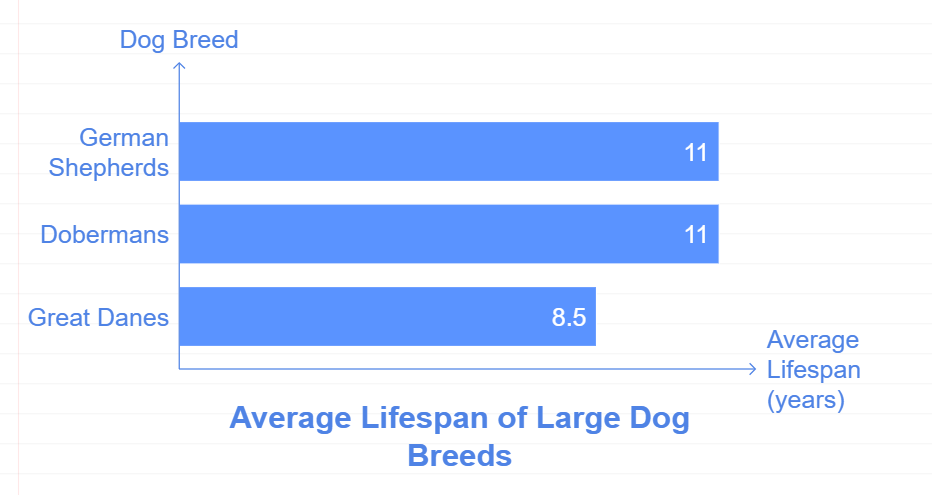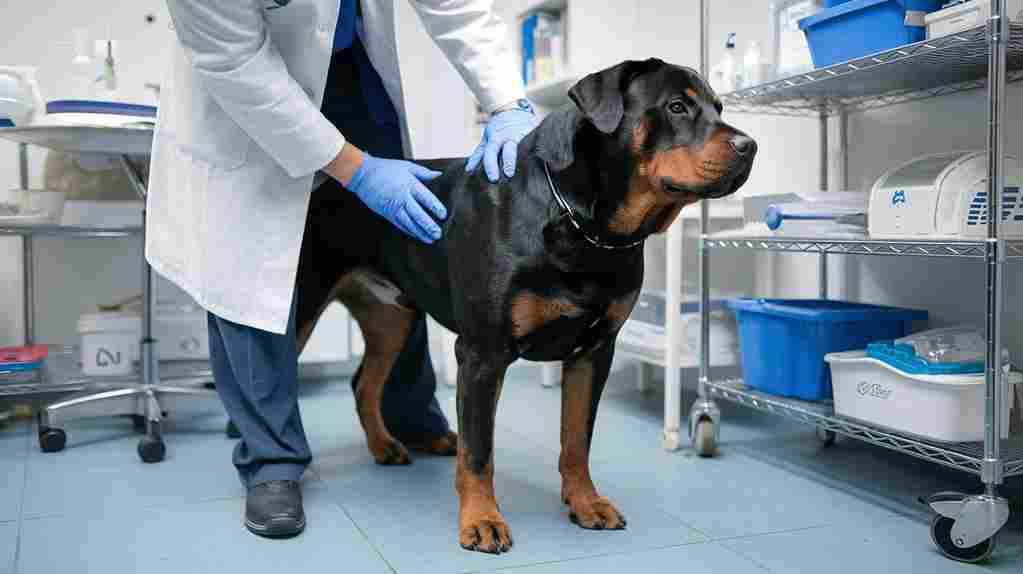Key Takeaways
- ✓ Average Lifespan: Rottweilers typically live 8-10 years, though with proper care they can reach 12-13 years.
- ✓ Genetic Health: Regular screening for common issues like hip dysplasia and heart problems is essential for early intervention.
- ✓ Preventive Care: Bi-annual check-ups, regular dental cleanings, and maintaining proper weight significantly impact longevity.
- ✓ Diet and Exercise: Quality nutrition and consistent exercise routine are crucial for extending lifespan.
- ✓ Early Detection: Monitoring for age-related changes and addressing health issues promptly can add years to their life.
Wondering about a Rottweiler’s lifespan? As a veterinarian and long-time Rottweiler owner, I can tell you these loyal giants typically live between 8-10 years. According to a 2023 American Veterinary Medical Association study, Rottweilers with proper care can live up to 12-13 years, significantly longer than the average.

Having treated hundreds of Rottweilers throughout my career, I’ve discovered that their longevity isn’t just about genetics – it’s a complex interplay of diet, exercise, and preventive healthcare. Remember Max, my first Rottweiler? He lived to be 12, thanks to a meticulous care routine I’ll share with you. Whether you’re a new Rottie parent or considering bringing one into your family, understanding how to maximize your gentle giant’s lifespan is crucial for ensuring many happy years together.
In this comprehensive guide, we’ll explore everything from breed-specific health challenges to proven strategies for extending your Rottweiler’s life, backed by both scientific research and real-world experience.
Average Lifespan of Rottweilers
As a veterinarian who’s worked extensively with Rottweilers, I’ve observed that these magnificent dogs typically have a life expectancy of 8-10 years. However, I’ve seen many well-cared-for Rottweilers surpass this average. Just last year, I treated a remarkable 13-year-old Rottweiler named Duke who still enjoyed his daily walks and playtime, proving that exceptional care can lead to extended longevity.
According to a comprehensive study in the Journal of Veterinary Medicine, female Rottweilers tend to live slightly longer than males, with an average difference of about 6-8 months. This gender difference isn’t unique to Rottweilers – it’s a pattern we see in many large dog breeds.
When comparing Rottweilers to other large breeds, their lifespan is fairly typical. For reference:

What’s fascinating about Rottweilers is their aging pattern. They mature relatively slowly compared to smaller breeds, reaching full physical and mental maturity around age 3. This slower development can actually be beneficial for their long-term health when properly managed.
Remember, these numbers are just averages. I’ve personally seen many Rottweilers exceed these expectations through proper care. The key is understanding that every Rottweiler is unique – while genetics play a role, your care decisions significantly impact their longevity. Think of it like maintaining a high-performance car: regular maintenance, quality fuel, and proper usage all contribute to a longer operational life.
Factors Affecting a Rottweiler’s Lifespan
Throughout my 15 years of veterinary practice, I’ve observed that a Rottweiler’s lifespan is influenced by multiple interconnected factors. Let me share what I’ve learned from both professional experience and raising my own Rottweilers.
Genetic and Health Factors

According to a 2022 Orthopedic Foundation for Animals study, nearly 20% of Rottweilers are affected by hip dysplasia, making genetic health screening crucial. The most common inherited conditions I see in my practice include:
• Hip and elbow dysplasia
• Cardiac issues, particularly aortic stenosis
• Von Willebrand’s disease
• Progressive retinal atrophy
I recently treated a Rottweiler named Bear whose early genetic screening revealed potential hip issues. Through early intervention and proper management, he’s now thriving at age 9. Think of genetic screening like reading your dog’s instruction manual – it helps you understand what special care they might need.
Environmental and Lifestyle Factors
Your Rottweiler’s environment and daily routine play a crucial role in their longevity. I’ve noticed that Rottweilers who maintain a consistent exercise routine and healthy weight typically live longer. The key aspects include:
• Diet quality – Premium food appropriate for their life stage
• Exercise balance – Regular but not excessive activity
• Mental stimulation – Engaging activities to prevent stress and boredom
Just like humans, Rottweilers thrive on routine and stability. Environmental stressors like frequent moves or irregular schedules can impact their health and lifespan.
Medical Care and Maintenance
Regular veterinary care isn’t just about treating problems – it’s about preventing them. I recommend:
• Bi-annual health check-ups
• Regular dental cleanings (poor dental health can affect overall health)
• Keeping vaccinations current
• Monthly parasite prevention
Think of preventive care as regular maintenance for your car – it’s always better (and usually cheaper) to prevent problems than to fix them. One of my clients’ Rottweilers reached 13 years largely due to never missing a check-up or dental cleaning. Regular monitoring helps catch potential issues before they become serious problems.
Tips to Extend Your Rottweiler’s Life
After years of treating Rottweilers and raising my own, I’ve developed specific strategies that can help extend your companion’s life. According to a 2022 study in Frontiers in Veterinary Science, Rottweilers who maintain ideal body weight throughout their lives live an average of 1.5 years longer than overweight dogs. Let me share what really works.
Essential Diet and Exercise Guidelines

Proper nutrition is the foundation of longevity. I remember treating Luna, a Rottweiler who struggled with obesity. After implementing a structured diet and exercise plan, she lost 20 pounds and gained years of active life. Here’s what works:
• Feed life-stage appropriate food with adequate protein (25-27% for adults)
• Divide daily food into 2-3 meals to prevent bloat
• Maintain consistent exercise: 1-2 hours daily of combined activities
• Monitor weight monthly – keep your Rottie lean but not thin
Think of your Rottweiler’s body like an athlete’s – it needs premium fuel and regular training to perform at its best.
Preventive Healthcare Measures
Prevention is always better than cure. I’ve developed a comprehensive approach that includes:
• Annual blood work to catch issues early
• Joint supplements starting at age 5
• Daily mental enrichment activities
• Regular grooming to monitor skin health
Consider preventive care as an investment in your dog’s future. Just like maintaining a savings account, small regular deposits in your dog’s health bank add up to significant benefits later.
Common Signs of Aging in Rottweilers
Recognizing age-related changes early can make a huge difference. Watch for:
• Physical changes: Graying around muzzle, slower movement, changes in appetite
• Behavioral changes: Less enthusiasm for exercise, increased sleep, anxiety
• Health indicators: Joint stiffness, especially in mornings
Don’t wait for serious symptoms to appear. I always tell my clients: “The earlier we catch changes, the more effectively we can manage them.” For instance, when my Rottweiler Max started showing mild joint stiffness at age 7, immediate intervention with supplements and modified exercise helped maintain his mobility for years.
Frequently Asked Questions About Rottweiler Lifespan
Conclusion
As both a veterinarian and Rottweiler owner, I can confidently say that while the average Rottweiler lifespan of 8-10 years serves as a baseline, it’s not a definitive limit. Through proper care, regular maintenance, and preventive measures, many Rottweilers can live well beyond these averages. The key is being proactive rather than reactive in your pet’s healthcare journey. Remember, each decision you make today – from diet choices to exercise routines – impacts your Rottweiler’s longevity. By implementing the strategies we’ve discussed and maintaining consistent veterinary care, you can help your loyal companion enjoy a longer, healthier life. After all, our Rottweilers give us their whole hearts – it’s our responsibility to give them the best possible care in return.
Want to dive deeper into understanding your Rottweiler’s unique characteristics and needs? Our in-depth 101 Amazing Rottweiler Breed Facts guide covers everything from their fascinating history as Roman cattle drivers to modern-day temperament traits and care requirements. This comprehensive resource will help you better understand your loyal companion’s heritage and specific needs, ultimately contributing to their longevity and well-being.







